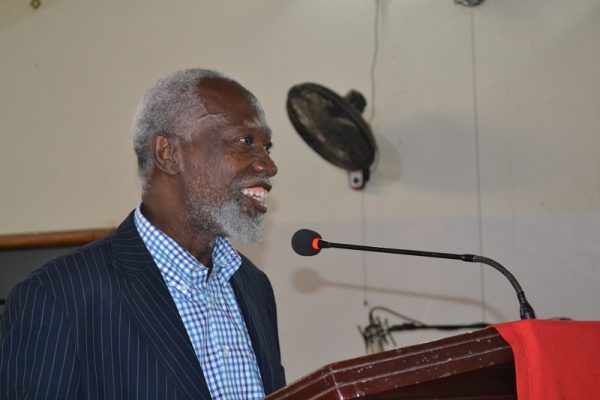 A former Rector of the Ghana Institute of Management and Public Administration (GIMPA), Professor Stephen Adei, has advocated the declaration of assets by government appointees to be made public. A former Rector of the Ghana Institute of Management and Public Administration (GIMPA), Professor Stephen Adei, has advocated the declaration of assets by government appointees to be made public.
He said that was necessary “so that we can know what they came in with and what they are going out with.”
Prof. Adei said this at the launch of the Good Corporate Governance Initiative in Accra organised by Krif Ghana, in collaboration with Action Chapel International and the United States Embassy in Ghana.
The event was held on the theme: ‘Accelerating Ghana’s Development through Transparency and Integrity – From Talk to Action.’’
Contributing to the topic: ‘‘Implementing Integrity into Ghana’s National Development Agenda,’’ Prof. Adei said he was not against people acquiring property, “It is only when you get through the corrupt way that we have to worry about it.”
He, therefore, commended President Nana Addo Dankwa Akufo-Addo for declaring his assets upon getting into office and called on him to insist on those he had appointed into public offices to also declare their assets within their first 14 days in office.
Investigate NDC administration
Prof. Adei stated that politicians, public office holders and persons who had been involved in corruption in the past must not be allowed to go away with it.
He insisted that they must be investigated and brought to book to serve as a deterrent to others, saying: ‘‘This is not a political witch-hunting,’’ explaining that public office holders in the immediate past government must be investigated and dealt with in accordance with the law.
“I think that the NDC administration which has just left office must be investigated to send a warning to the NPP administration that when they are going, they will also be held accountable.”
“It is inconceivable that deputy ministers in just four years had three houses in East Legon and the rest,’’ he stressed, adding that if they did not account for how they got their assets, there was no way other people would have confidence in the system.
He noted that corruption in the previous government reached unacceptable levels and said it was, therefore, a good omen that the current administration had shown commitment to hold public office holders accountable.
Prof. Adei, who is currently with the Ashesi University, said the principle of transparency, accountability and integrity were the cornerstone for the progress of any nation, therefore if the leadership of the country lacked these fundamental elements, things would deteriorate.
Corruption at GRA
He urged the Nana Addo Dankwa Akufo-Addo-led government to immediately launch an investigation into the activities of the Ghana Revenue Authority (GRA).
Describing the GRA as a den of corruption, Prof. Adei charged the government to look into the activities of the institution. He cited an instance where some of the collectors tried extorting money from a company and when they were exposed, they imposed a huge levy on the company.
“In other words, ‘if you don’t allow us to chop, we will destroy your business,’ and this must not be allowed,” he said, adding that if such practices were not tackled, they had the potential of collapsing businesses.
Prof. Adei said for instance that at the GRA, Lands Commission and many other places, some of the rates of taxation were very high and so when people went there to transact business, they negotiated and “???stay loose for three quarters of the revenue??? and then the officials get about 10 per cent for their pockets.”
Bureaucratic corruption
On bureaucratic corruption, he said the public often criticised politicians and public office holders for corruption but lost sight of the pervasive corruption in the public sector, adding: “Bureaucratic corruption has reached unacceptable levels in the country and must be tackled systematically.”
Prof. Adei urged the public servants to simplify rules of processing documents in the country to earn trust from the public.
“They must simplify the rules, so that when you are registering a company, there is no reason why it should take you a week. When you are clearing things from the port, you don’t have to go through 52 or 53 steps in order to get your goods cleared,” he said.
|